Every year, I do a roundup of my favourite games that I played throughout the year. Previous years: 2013, 2014, 2015
Everybody’s Gone to the Rapture
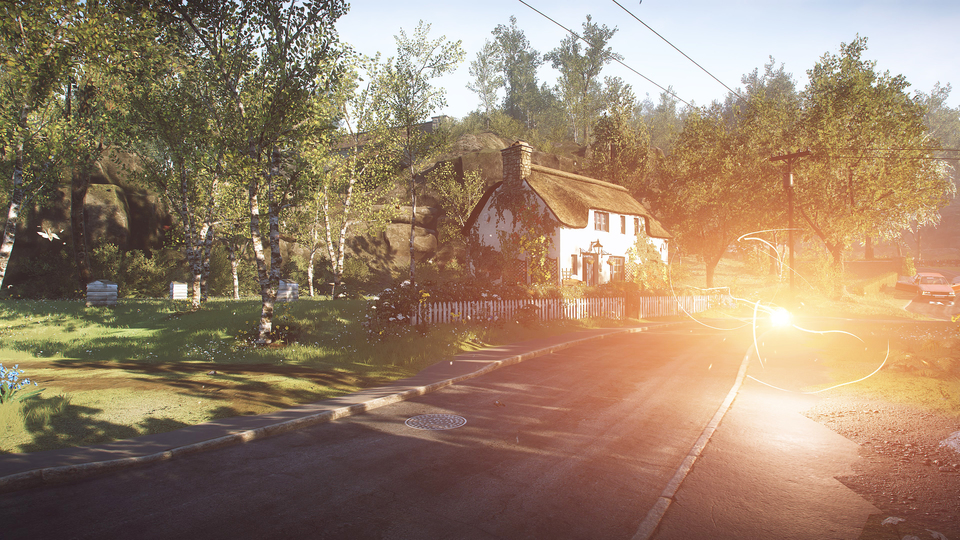 Okay, so technically this game came out in 2015, which is a great start to a year-end list for 2016. I played it when it first came out and it just didn’t click with me. I’m not sure why. I knew going in that it fell under the ‘walking simulator’ umbrella. But I guess I was expecting more of a Gone Home style experience, where the game gives you an environment to explore and examine and a story that you uncover — or flesh out — for yourself. Except, as I found out, EGTTR is not that type of game. It’s more like a radio play crossed with a heavy dose of Sleep No More. So, last month, I went back and played it like that, like it was a play that I was witnessing rather than actually being any part of, and the game bowled me over. It’s poetic and beautiful without ever being mawkish and it’s one of a handful of games to have ever made me cry.
Okay, so technically this game came out in 2015, which is a great start to a year-end list for 2016. I played it when it first came out and it just didn’t click with me. I’m not sure why. I knew going in that it fell under the ‘walking simulator’ umbrella. But I guess I was expecting more of a Gone Home style experience, where the game gives you an environment to explore and examine and a story that you uncover — or flesh out — for yourself. Except, as I found out, EGTTR is not that type of game. It’s more like a radio play crossed with a heavy dose of Sleep No More. So, last month, I went back and played it like that, like it was a play that I was witnessing rather than actually being any part of, and the game bowled me over. It’s poetic and beautiful without ever being mawkish and it’s one of a handful of games to have ever made me cry.
Rise of the Tomb Raider/Uncharted 4
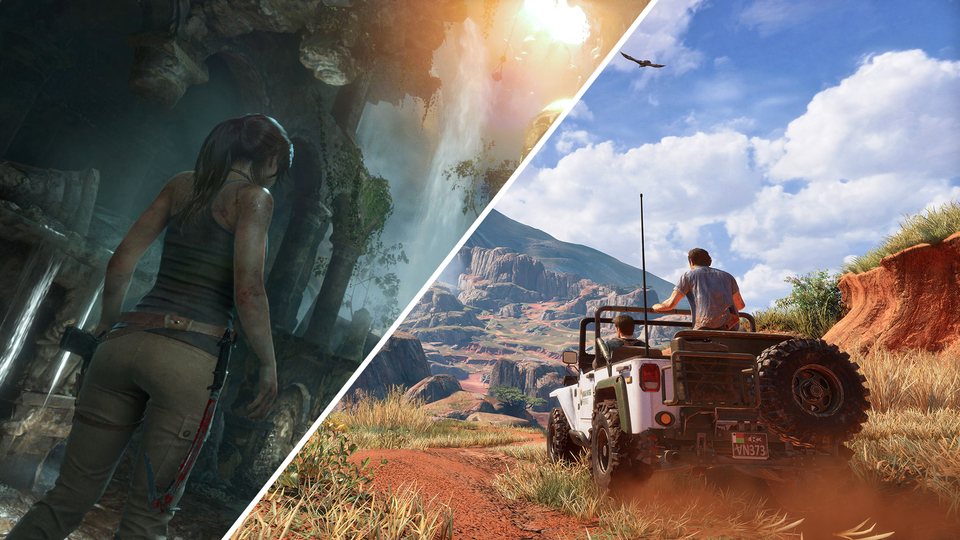 I don’t think it’s cheating to put both of these games on here. They’re both really fun games that are great at different things. Uncharted had a great, grown-up story (a hero trying to settle down and re-adjust his priorities) and had the best free-flowing combat of any game I’ve played this year. In the previous Uncharted games, I’d hide behind cover and pick off the baddies one-by-one. In this, I was finally whizzing around the levels like the badass the game wanted me to be. Tomb Raider, on the other hand, had better, uh, tombs. Better puzzles that took advantage of the environment. The Baba Yaga DLC (which comes loaded on the PS4 disk) is stunning and a wild departure from what you’d expect from a triple-A blockbuster game.
I don’t think it’s cheating to put both of these games on here. They’re both really fun games that are great at different things. Uncharted had a great, grown-up story (a hero trying to settle down and re-adjust his priorities) and had the best free-flowing combat of any game I’ve played this year. In the previous Uncharted games, I’d hide behind cover and pick off the baddies one-by-one. In this, I was finally whizzing around the levels like the badass the game wanted me to be. Tomb Raider, on the other hand, had better, uh, tombs. Better puzzles that took advantage of the environment. The Baba Yaga DLC (which comes loaded on the PS4 disk) is stunning and a wild departure from what you’d expect from a triple-A blockbuster game.
TIS-100/Quadrilateral Cowboy
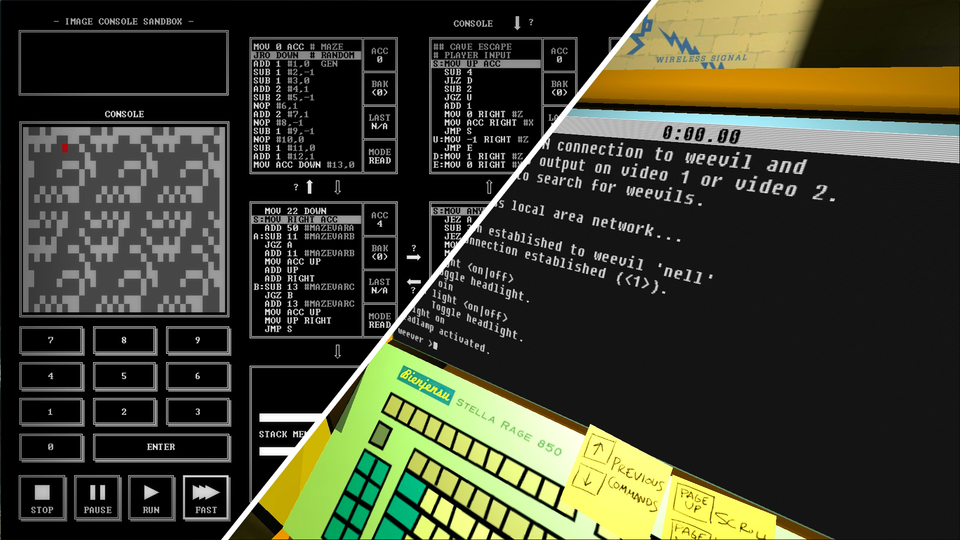 Look, if I can put Uncharted and Tomb Raider together on this list because of a thematic link, I can definitely put TIS-100 and Quadrilateral Cowboy together. In TIS-100, you have to solve a series of programming puzzles by writing assembly. Assembly! It’s frustrating and you spend most of your play-time just staring at the screen, not typing anything. And oh my God, it’s so rewarding when you finally figure it out. Just like real programming! Best part is that when you solve it, it shows you a leaderboard of how you did compared to your steam friends. If you’ve got nerdy programming friends, this is a huge pissing contest and it’s great.
Look, if I can put Uncharted and Tomb Raider together on this list because of a thematic link, I can definitely put TIS-100 and Quadrilateral Cowboy together. In TIS-100, you have to solve a series of programming puzzles by writing assembly. Assembly! It’s frustrating and you spend most of your play-time just staring at the screen, not typing anything. And oh my God, it’s so rewarding when you finally figure it out. Just like real programming! Best part is that when you solve it, it shows you a leaderboard of how you did compared to your steam friends. If you’ve got nerdy programming friends, this is a huge pissing contest and it’s great.
On the other hand, Quadrilateral Cowboy is about hacking to pull off elaborate heists. William Gibson meets Oceans Eleven. The game’s action is more physical than TIS-100. You type your commands into your ‘deck’ in the game. For example, you program a door to open for five seconds, which should be just enough time for you to grab your deck and run through before the door shuts but not so long that the alarm will trigger. The real fun comes in stringing together a series of commands so that things will happen in sequence and allow you to steal the maguffin. Get that timing just right and you felt like you’re in Mission Impossible or something. But like, one of the good ones.
The Witness
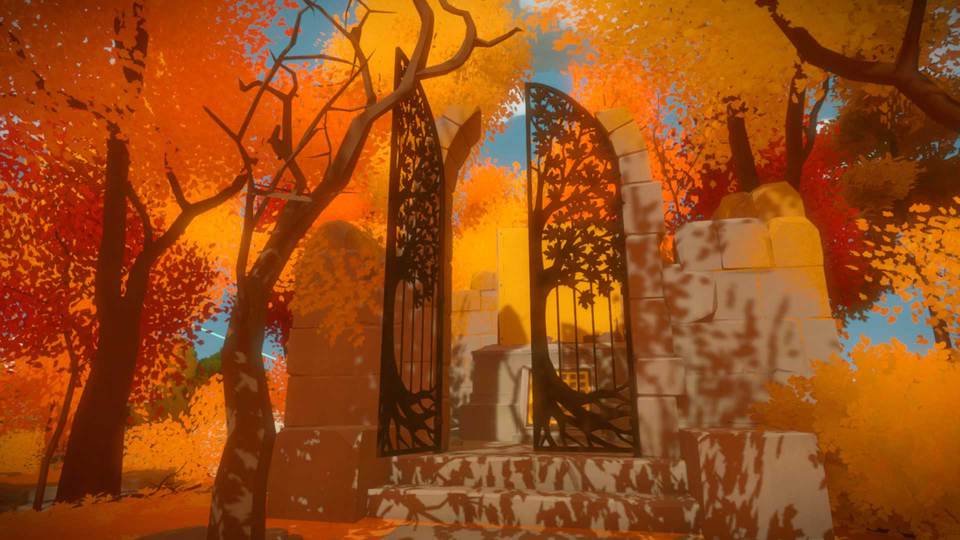 Stop me if you’ve heard me tell this story before. When I was in my early twenties, I taught myself how to juggle. And the hardest part, I found, was just getting my brain to learn to let go of that third ball when two were already in flight. I spent weeks trying to throw that third ball in the air. I just couldn’t do it. My hand wouldn’t release it. Then, one day, something clicked – and I mean clicked, like I felt a physical sensation in my brain – and I could suddenly do it, no problem.
Stop me if you’ve heard me tell this story before. When I was in my early twenties, I taught myself how to juggle. And the hardest part, I found, was just getting my brain to learn to let go of that third ball when two were already in flight. I spent weeks trying to throw that third ball in the air. I just couldn’t do it. My hand wouldn’t release it. Then, one day, something clicked – and I mean clicked, like I felt a physical sensation in my brain – and I could suddenly do it, no problem.
The Witness was that feeling again and again and again. Puzzles you think you’ll never be able to do, then suddenly, something clicks and you’re able to solve them. And then you build on that knowledge when you encounter the next thing you think you’ll never be able to do. Rewarding and beautiful.
Firewatch
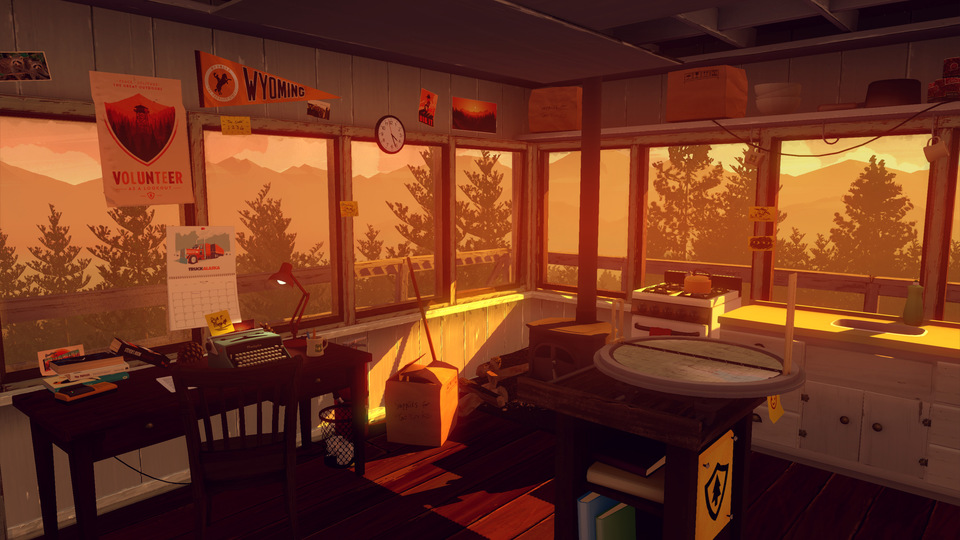 Firewatch starts with a strong emotional flourish every bit as powerful as the opening of Pixar’s Up. And the genius of this bit of storytelling is that it completely affects the way you play the game, the choices you make. It’s a walking simulator – a nice hike in the woods simulator, really – with a deep undercurrent of melancholy and loss. The development team has a pedigree that meant I was at least expecting something interesting. I wasn’t expecting something so mature, so confident and so emotionally resonant.
Firewatch starts with a strong emotional flourish every bit as powerful as the opening of Pixar’s Up. And the genius of this bit of storytelling is that it completely affects the way you play the game, the choices you make. It’s a walking simulator – a nice hike in the woods simulator, really – with a deep undercurrent of melancholy and loss. The development team has a pedigree that meant I was at least expecting something interesting. I wasn’t expecting something so mature, so confident and so emotionally resonant.
Hitman
 This year’s Hitman got so many things right. The slow roll-out of episodes meant that you didn’t feel that compulsion to just finish one level as quickly as possible so you could move onto the next one. You had time to get comfortable with each level and slowly ease yourself into the game’s mechanics. It also meant you were encouraged to explore, to try different things, try absurd things. But the thing I loved most about it was how ridiculous it allowed itself to be. It embraces the silliness of the game, from the opening training level set on a soundstage with a cardboard helicopter, right through to the Christmas DLC where your targets are the burglars from Home Alone. This was the first Hitman game I truly enjoyed.
This year’s Hitman got so many things right. The slow roll-out of episodes meant that you didn’t feel that compulsion to just finish one level as quickly as possible so you could move onto the next one. You had time to get comfortable with each level and slowly ease yourself into the game’s mechanics. It also meant you were encouraged to explore, to try different things, try absurd things. But the thing I loved most about it was how ridiculous it allowed itself to be. It embraces the silliness of the game, from the opening training level set on a soundstage with a cardboard helicopter, right through to the Christmas DLC where your targets are the burglars from Home Alone. This was the first Hitman game I truly enjoyed.
Anatomy
 There were a lot of quote-unquote ‘horror’ games in 2016 (I feel like the world reached peak ‘survival’ game this year), but these were mostly of the quiet-quiet-LOUD jump-scare variety. That’s fun and all, but it’s so one-note, it gets a little repetitive. Only one game genuinely chilled me this year and it was Kitty Horrorshow’s Anatomy. A short, brutally efficient horror experience, which gives you the most mundane environment – a suburban home – then changes that out from underneath you on subsequent playthroughs. This is the simplest game on this list but it’s the one that’s stuck with me the most.
There were a lot of quote-unquote ‘horror’ games in 2016 (I feel like the world reached peak ‘survival’ game this year), but these were mostly of the quiet-quiet-LOUD jump-scare variety. That’s fun and all, but it’s so one-note, it gets a little repetitive. Only one game genuinely chilled me this year and it was Kitty Horrorshow’s Anatomy. A short, brutally efficient horror experience, which gives you the most mundane environment – a suburban home – then changes that out from underneath you on subsequent playthroughs. This is the simplest game on this list but it’s the one that’s stuck with me the most.
Overwatch
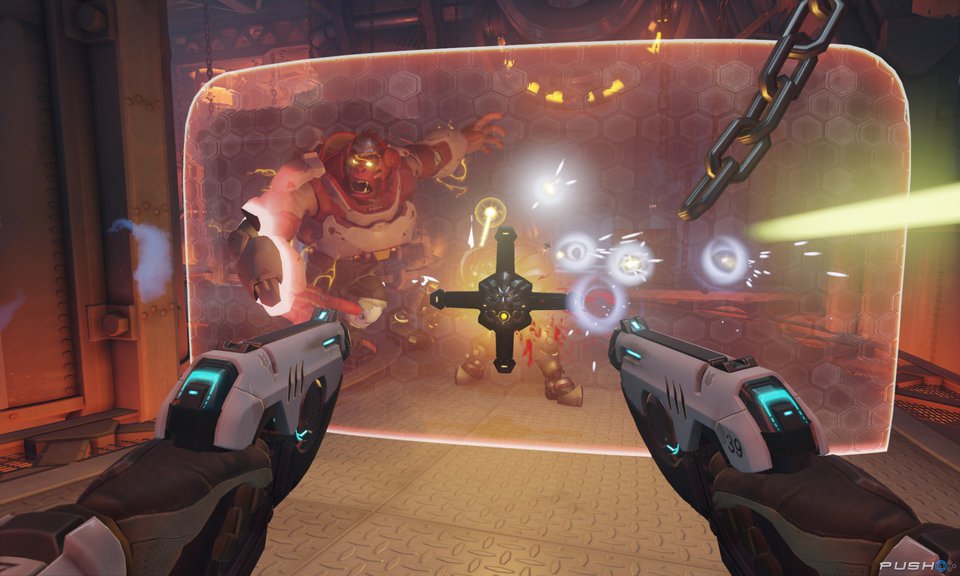 I’m terrible at shooting games. Just terrible. I’ve got old man hands, slow reactions and poor situational awareness. Oh, and I panic really easily. But here’s what I loved about Overwatch: none of this matters. You can have all of these things and still contribute to you team’s success.
I’m terrible at shooting games. Just terrible. I’ve got old man hands, slow reactions and poor situational awareness. Oh, and I panic really easily. But here’s what I loved about Overwatch: none of this matters. You can have all of these things and still contribute to you team’s success.
Inside
 Stylistically, this is kind of reminiscent of the developer’s previous game, Limbo. But while Limbo was a cold, austere game with beautiful visuals, there’s something warm and human about Inside. A few minutes into the game, you’re followed by a gang of chicks. It’s one of the cutest things you’ll see. Tiny chirping pixels following you around. A little while later, a puzzle involves you sucking these chicks into a machine so they get spat out the top to hit a block and knock it where you can use the block. Then the chicks all run off. Except one. A chick — a tiny group of pixels — doesn’t move. And it’s devastating.
Stylistically, this is kind of reminiscent of the developer’s previous game, Limbo. But while Limbo was a cold, austere game with beautiful visuals, there’s something warm and human about Inside. A few minutes into the game, you’re followed by a gang of chicks. It’s one of the cutest things you’ll see. Tiny chirping pixels following you around. A little while later, a puzzle involves you sucking these chicks into a machine so they get spat out the top to hit a block and knock it where you can use the block. Then the chicks all run off. Except one. A chick — a tiny group of pixels — doesn’t move. And it’s devastating.
The Last Guardian
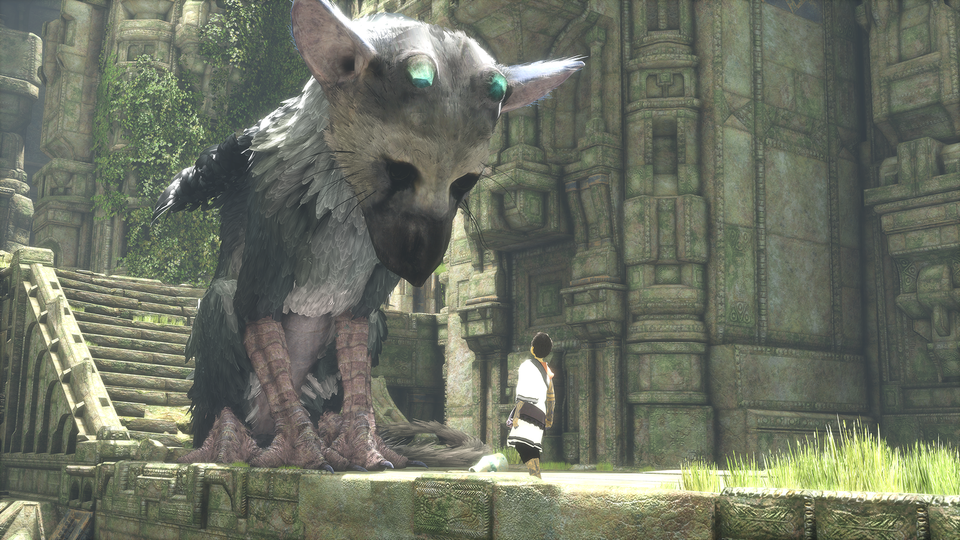 For the first couple of hours with The Last Guardian, I was worried. I was finally playing the game I’d been waiting almost nine years for. The game whose original announcement had me rushing out to buy a PS3 the next day. The game that was the spiritual sequel to two of my favourite games of all time. And I wasn’t enjoying it. It was cold and clunky. Was this what I’d been waiting for? But then I got to the part they’d shown in countless trailers. Jumping from bridge to bridge. And when Trico reached out to catch me with his mouth but missed and then swung his tail around for me to catch, I found myself holding my breath. Even though I’d seen this happen before. And I knew the game had worked its magic and got its hooks in me, hard.
For the first couple of hours with The Last Guardian, I was worried. I was finally playing the game I’d been waiting almost nine years for. The game whose original announcement had me rushing out to buy a PS3 the next day. The game that was the spiritual sequel to two of my favourite games of all time. And I wasn’t enjoying it. It was cold and clunky. Was this what I’d been waiting for? But then I got to the part they’d shown in countless trailers. Jumping from bridge to bridge. And when Trico reached out to catch me with his mouth but missed and then swung his tail around for me to catch, I found myself holding my breath. Even though I’d seen this happen before. And I knew the game had worked its magic and got its hooks in me, hard.



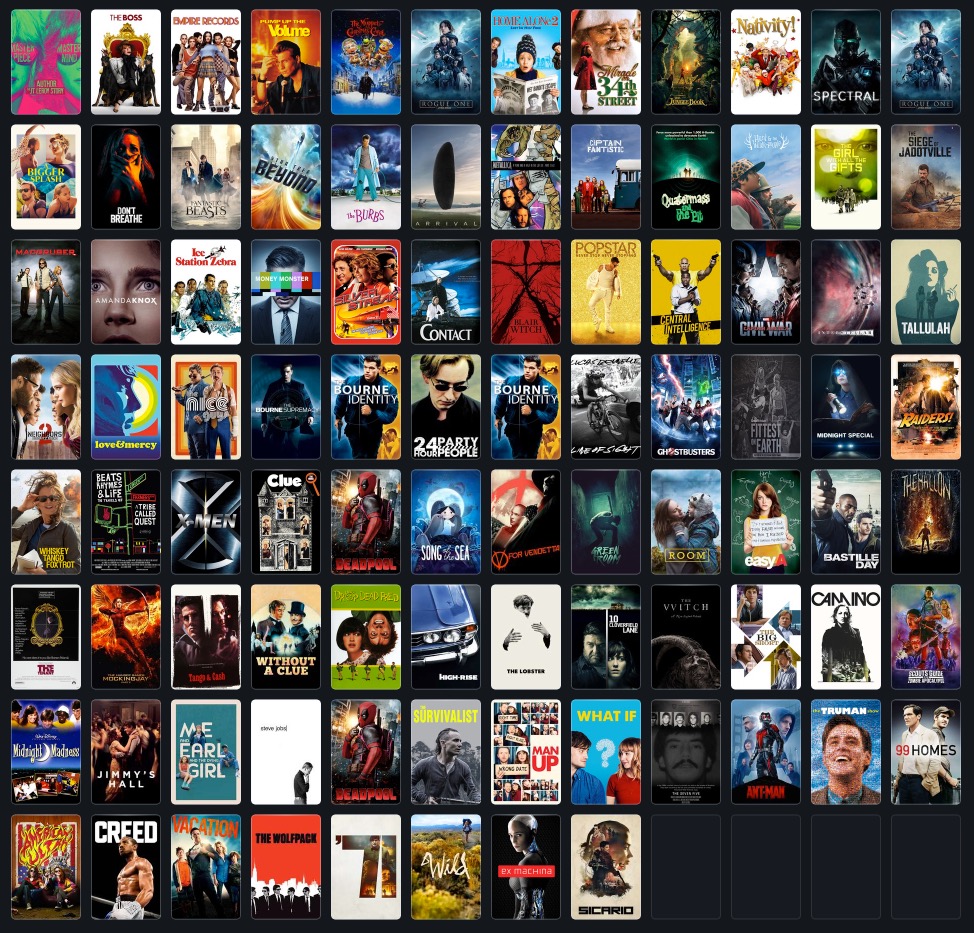
 Okay, so technically this game came out in 2015, which is a great start to a year-end list for 2016. I played it when it first came out and it just didn’t click with me. I’m not sure why. I knew going in that it fell under the ‘walking simulator’ umbrella. But I guess I was expecting more of a Gone Home style experience, where the game gives you an environment to explore and examine and a story that you uncover — or flesh out — for yourself. Except, as I found out, EGTTR is not that type of game. It’s more like a radio play crossed with a heavy dose of
Okay, so technically this game came out in 2015, which is a great start to a year-end list for 2016. I played it when it first came out and it just didn’t click with me. I’m not sure why. I knew going in that it fell under the ‘walking simulator’ umbrella. But I guess I was expecting more of a Gone Home style experience, where the game gives you an environment to explore and examine and a story that you uncover — or flesh out — for yourself. Except, as I found out, EGTTR is not that type of game. It’s more like a radio play crossed with a heavy dose of  I don’t think it’s cheating to put both of these games on here. They’re both really fun games that are great at different things. Uncharted had a great, grown-up story (a hero trying to settle down and re-adjust his priorities) and had the best free-flowing combat of any game I’ve played this year. In the previous Uncharted games, I’d hide behind cover and pick off the baddies one-by-one. In this, I was finally whizzing around the levels like the badass the game wanted me to be. Tomb Raider, on the other hand, had better, uh, tombs. Better puzzles that took advantage of the environment. The Baba Yaga DLC (which comes loaded on the PS4 disk) is stunning and a wild departure from what you’d expect from a triple-A blockbuster game.
I don’t think it’s cheating to put both of these games on here. They’re both really fun games that are great at different things. Uncharted had a great, grown-up story (a hero trying to settle down and re-adjust his priorities) and had the best free-flowing combat of any game I’ve played this year. In the previous Uncharted games, I’d hide behind cover and pick off the baddies one-by-one. In this, I was finally whizzing around the levels like the badass the game wanted me to be. Tomb Raider, on the other hand, had better, uh, tombs. Better puzzles that took advantage of the environment. The Baba Yaga DLC (which comes loaded on the PS4 disk) is stunning and a wild departure from what you’d expect from a triple-A blockbuster game. Look, if I can put Uncharted and Tomb Raider together on this list because of a thematic link, I can definitely put TIS-100 and Quadrilateral Cowboy together. In TIS-100, you have to solve a series of programming puzzles by writing assembly. Assembly! It’s frustrating and you spend most of your play-time just staring at the screen, not typing anything. And oh my God, it’s so rewarding when you finally figure it out. Just like real programming! Best part is that when you solve it, it shows you a leaderboard of how you did compared to your steam friends. If you’ve got nerdy programming friends, this is a huge pissing contest and it’s great.
Look, if I can put Uncharted and Tomb Raider together on this list because of a thematic link, I can definitely put TIS-100 and Quadrilateral Cowboy together. In TIS-100, you have to solve a series of programming puzzles by writing assembly. Assembly! It’s frustrating and you spend most of your play-time just staring at the screen, not typing anything. And oh my God, it’s so rewarding when you finally figure it out. Just like real programming! Best part is that when you solve it, it shows you a leaderboard of how you did compared to your steam friends. If you’ve got nerdy programming friends, this is a huge pissing contest and it’s great. Stop me if you’ve heard me tell this story before. When I was in my early twenties, I taught myself how to juggle. And the hardest part, I found, was just getting my brain to learn to let go of that third ball when two were already in flight. I spent weeks trying to throw that third ball in the air. I just couldn’t do it. My hand wouldn’t release it. Then, one day, something clicked – and I mean clicked, like I felt a physical sensation in my brain – and I could suddenly do it, no problem.
Stop me if you’ve heard me tell this story before. When I was in my early twenties, I taught myself how to juggle. And the hardest part, I found, was just getting my brain to learn to let go of that third ball when two were already in flight. I spent weeks trying to throw that third ball in the air. I just couldn’t do it. My hand wouldn’t release it. Then, one day, something clicked – and I mean clicked, like I felt a physical sensation in my brain – and I could suddenly do it, no problem. Firewatch starts with a strong emotional flourish every bit as powerful as the opening of Pixar’s Up. And the genius of this bit of storytelling is that it completely affects the way you play the game, the choices you make. It’s a walking simulator – a nice hike in the woods simulator, really – with a deep undercurrent of melancholy and loss. The development team has a pedigree that meant I was at least expecting something interesting. I wasn’t expecting something so mature, so confident and so emotionally resonant.
Firewatch starts with a strong emotional flourish every bit as powerful as the opening of Pixar’s Up. And the genius of this bit of storytelling is that it completely affects the way you play the game, the choices you make. It’s a walking simulator – a nice hike in the woods simulator, really – with a deep undercurrent of melancholy and loss. The development team has a pedigree that meant I was at least expecting something interesting. I wasn’t expecting something so mature, so confident and so emotionally resonant. This year’s Hitman got so many things right. The slow roll-out of episodes meant that you didn’t feel that compulsion to just finish one level as quickly as possible so you could move onto the next one. You had time to get comfortable with each level and slowly ease yourself into the game’s mechanics. It also meant you were encouraged to explore, to try different things, try absurd things. But the thing I loved most about it was how ridiculous it allowed itself to be. It embraces the silliness of the game, from the opening training level set on a soundstage with a cardboard helicopter, right through to the Christmas DLC
This year’s Hitman got so many things right. The slow roll-out of episodes meant that you didn’t feel that compulsion to just finish one level as quickly as possible so you could move onto the next one. You had time to get comfortable with each level and slowly ease yourself into the game’s mechanics. It also meant you were encouraged to explore, to try different things, try absurd things. But the thing I loved most about it was how ridiculous it allowed itself to be. It embraces the silliness of the game, from the opening training level set on a soundstage with a cardboard helicopter, right through to the Christmas DLC  There were a lot of quote-unquote ‘horror’ games in 2016 (I feel like the world reached peak ‘survival’ game this year), but these were mostly of the quiet-quiet-LOUD jump-scare variety. That’s fun and all, but it’s so one-note, it gets a little repetitive. Only one game genuinely chilled me this year and it was Kitty Horrorshow’s Anatomy. A short, brutally efficient horror experience, which gives you the most mundane environment – a suburban home – then changes that out from underneath you on subsequent playthroughs. This is the simplest game on this list but it’s the one that’s stuck with me the most.
There were a lot of quote-unquote ‘horror’ games in 2016 (I feel like the world reached peak ‘survival’ game this year), but these were mostly of the quiet-quiet-LOUD jump-scare variety. That’s fun and all, but it’s so one-note, it gets a little repetitive. Only one game genuinely chilled me this year and it was Kitty Horrorshow’s Anatomy. A short, brutally efficient horror experience, which gives you the most mundane environment – a suburban home – then changes that out from underneath you on subsequent playthroughs. This is the simplest game on this list but it’s the one that’s stuck with me the most. I’m terrible at shooting games. Just terrible. I’ve got old man hands, slow reactions and poor situational awareness. Oh, and I panic really easily. But here’s what I loved about Overwatch: none of this matters. You can have all of these things and still contribute to you team’s success.
I’m terrible at shooting games. Just terrible. I’ve got old man hands, slow reactions and poor situational awareness. Oh, and I panic really easily. But here’s what I loved about Overwatch: none of this matters. You can have all of these things and still contribute to you team’s success. Stylistically, this is kind of reminiscent of the developer’s previous game, Limbo. But while Limbo was a cold, austere game with beautiful visuals, there’s something warm and human
Stylistically, this is kind of reminiscent of the developer’s previous game, Limbo. But while Limbo was a cold, austere game with beautiful visuals, there’s something warm and human For the first couple of hours with The Last Guardian, I was worried. I was finally playing the game I’d been waiting almost nine years for. The game whose original announcement had me rushing out to buy a PS3 the next day. The game that was the spiritual sequel to two of my favourite games of all time. And I wasn’t enjoying it. It was cold and clunky. Was this what I’d been waiting for? But then I got to the part they’d shown in countless trailers. Jumping from bridge to bridge. And when Trico reached out to catch me with his mouth but missed and then swung his tail around for me to catch, I found myself holding my breath. Even though I’d seen this happen before. And I knew the game had worked its magic and got its hooks in me, hard.
For the first couple of hours with The Last Guardian, I was worried. I was finally playing the game I’d been waiting almost nine years for. The game whose original announcement had me rushing out to buy a PS3 the next day. The game that was the spiritual sequel to two of my favourite games of all time. And I wasn’t enjoying it. It was cold and clunky. Was this what I’d been waiting for? But then I got to the part they’d shown in countless trailers. Jumping from bridge to bridge. And when Trico reached out to catch me with his mouth but missed and then swung his tail around for me to catch, I found myself holding my breath. Even though I’d seen this happen before. And I knew the game had worked its magic and got its hooks in me, hard.